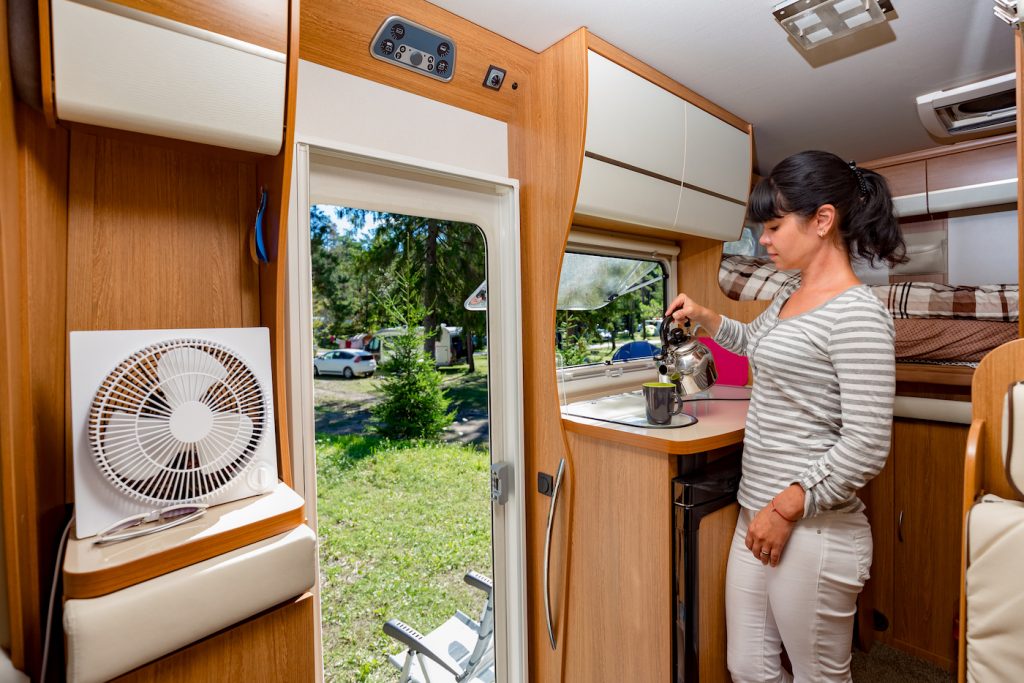
We all love the smell of a new RV—it pretty much rivals that of a new car, hands down—but after that much anticipated road trip, you start to notice that not so fresh feeling. Yep, it’s the dreaded RV odors: between cooking, pet accidents, off-gassing from the finishes, the holding tank, the moisture from the washer/sink/shower/, pollution, you name it, it stays, especially if the weather isn’t cooperating and you need to keep the windows closed. So how do you eliminate and prevent odors in your RV? With a little forethought and ingenuity, you can keep your camper smelling fresh every time you hit the road—from start to finish.
Holding tanks
Your RV holding tanks are not septic tanks. They’re actually more like giant chamber pots. They don’t need bacteria growth products like RidX and deodorizers can do more harm than good (think hot port-a-potties at the fair. Yeah. Gross.) Keeping them under control starts by dumping them out only when full, and then using a tank washer to make sure you clean the walls of anything that might have stuck on. That may or may not be enough to keep the stink under control, but before you reach for any of that blue deodorizer, we recommend using the safe GEO method created by Charles Bruni. His maintenance system uses water softener, laundry detergent and chlorine bleach and it’s been proven to work. P.S. Don’t use regular toilet tissue, it is guaranteed to clog things up.
Smelly potable water
The best solution is to sanitize your water system, especially if: the rig has been sitting for a month or more and the water system hasn’t been used; there’s a boil water advisory and you’ve already filled your tank; there’s algae and slime in your tank; and you know your filters don’t purify the water, merely eliminate sand and rust and improve taste and odor. Sanitize, sanitize, sanitize! The usual method involves hot water and bleach, and while it does take up a morning, you won’t need a science degree to do it.
RV refrigerator stink
Wiping the unit down with a soapy solution with a bit of bleach in it will do the trick, but you have to remember to let the refrigerator and freezer sit with the doors slightly open so all the moisture has a chance to dry. Otherwise, all your hard work will be for nothing. However, if it’s already stinky, there are several home remedies you can try, including setting a bowl of white vinegar in there, closing it up for several hours, then cutting an apple in half to replace the vinegar and leaving it in there overnight. Or, leave crushed up charcoal in a sheet of cheesecloth in the fridge overnight, use crumpled up newspaper or a cotton sock full of coffee beans. Whatever you do, always leave the doors propped open when not in use, and keep a box of baking soda inside.
Smelly carpets
The best way to eliminate smelly carpet odors—especially if it’s pet related—is to tear the whole thing out and install flooring. Carpets and RVs don’t really mix very well, and even though you can have the entire thing professionally cleaned, you’ll just have to do it again after your next multi-week/month road trip. Throw rugs can help, as can regular throws on your sofa cushions if your dogs or cats find them more comfortable than your floor. Dehumidifying products can help with mildew smells, which also tend to linger in the foam cushions.
Kitchen and bathroom drains
The smell is probably coming from the tank the sink drains into. When an RV sits for a while unused, the water in the sink drain trap dries out and lets the odor in through the sink drain. Keep the smell from forming by pouring a mixture of a cup of baking soda in a gallon of water down every drain, then dumping what’s left into the kitchen sink so the mixture goes into the gray water tank as well. When you’re traveling, it’s also a good idea to wipe as much food as possible out of your dishes using a paper towel or napkin to keep that gunk from going into the sink tank. Flush the tank with lots of water every so often to keep stuff from building up.







